Last Updated on January 4, 2024 by Kirsten Raccuia
Welcome to My Expat Interview Series. This is an insider’s sneak peek to the truths and realities of expat life. Not just from my point of view but from expats around the world. They are sharing their stories with the dreamers, the movers, the curious. You! This time you’ll meet Olivia who is living in Croatia.
The idea behind this series is to share other expat stories because:
1. You are probably bored to tears with me.
2. There is a world of opportunities out there. Maybe reading these interviews will inspire you to follow a dream that is more attainable than you ever thought.
3. I’m selfish. And totally nosy. I want to learn about how other expats live around the world. As much as I love Malaysia, I’m still a Sagittarius (read feisty, independent, traveler) who’s always ready for the next adventure.
So, without further ado… Let’s Dive into my Expat Interviews Series!
Meet Olivia – a lovely midwestern girl like myself, who made the decision to move to Zagreb for a year. Flash forward six years and she is still living in Croatia. So what is keeping her there? Keep reading to find out.
1. Tell me about yourself.
I’m Olivia. I am 29 years old and have been married to my husband Hrvoje (Hrv for short) for just over a year. We currently have no children, however, we do have a dog – her name is Bella. I was born and raised in Cleveland, Ohio, and lived there for 23 years before moving to my current home of Zagreb, Croatia. I’ve been living in Zagreb for a total of 6 years.
2. Why did you decide to move to Zagreb, Croatia?
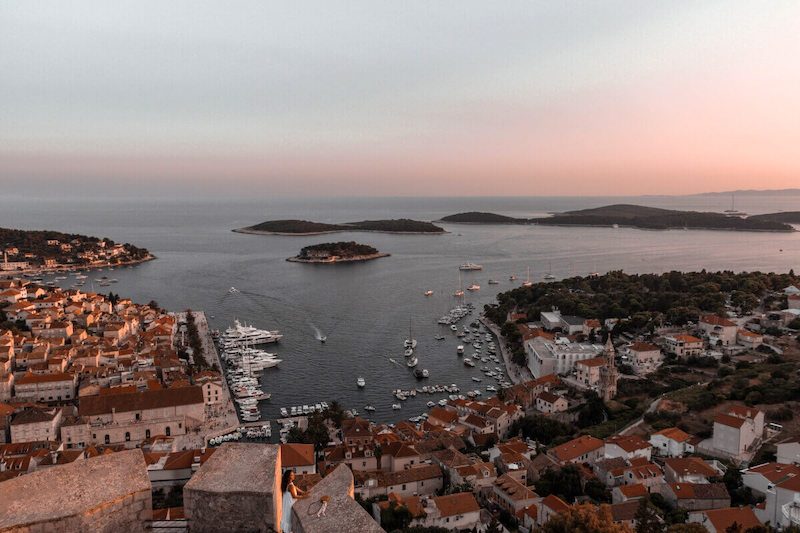
It’s hard to pinpoint exactly what made me move to Croatia (permanently).
I was born and raised in the USA to Croatian immigrant parents, and because of our deep family roots, we made frequent visits to the homeland. Several weeks spent catching up with relatives and floating in the Adriatic Sea each summer were some pretty incredible memories. Back then, however, visiting Croatia was only associated with fun family holidays. It was never a place I could imagine myself living one day.
After finishing my undergrad, I still wasn’t 100% set on what I wanted to do with the rest of my life. I toyed around with the idea of teaching abroad for a few years before discovering an MBA program that piqued my interest. It was at an international university in Zagreb, all of the classes were in English, and the program lasted one year. I decided it was a great opportunity to continue my studies and to get to know the “motherland” a bit better.
At the time, one year sounded like the perfect timeframe to get away. That was until I met my husband in the MBA program…and the rest was history.
3. What struggles did you have when you decided to leave your old life behind?
I was a bit nervous, but very excited when I initially decided to go to Croatia. This was because I knew that I would be coming back (at least that’s what I thought back then).
Moving to Croatia for me was more like a gradual transition instead of a sudden “pack your bags and move across the world” situation. I think that is part of the reason why I was able to adapt so well, because it never really felt permanent until one day it was…just without all of the flashing lights and fireworks.
4. Is living in Croatia expensive? What is the cost of living like in Zagreb, specifically?
The cost of living in Zagreb can be as affordable or as expensive as you make it.
Rent can be quite expensive, especially for those wanting to live in the city center. A one-bedroom apartment in the heart of Zagreb will typically set you back 500 EUR. For this price, you can expect an apartment in an old building with no elevator. Nicer apartments go for anywhere between 700 EUR to 1,000 EUR a month.
There are a number of neighborhoods outside of the city center that offer better options and are still well-connected to downtown by tram or by bus. In these areas, you can find a decent two-bedroom apartment for 400 EUR to 500 EUR a month.
Depending on the size of your apartment, utilities will run you around 100 EUR per month.
The good news is that groceries are relatively cheap. Shopping at the farmers market on the weekends is a great way to save money, support local businesses, and eat fresh food. When I can, I try to get all of my food for the week from the local market.
When it comes to eating out, a meal at a mid-range restaurant will run you about 13 EUR to 20 EUR per person. A beer at a neighborhood cafe will cost you around 3 EUR, while cocktails at a nightclub ring in at around 10 EUR each.
5. How have you supported yourself financially while living in Croatia?

When I first moved to Croatia, I worked remotely for a staffing company back home in Cleveland. Later, I got into marketing and now work as a digital content manager.
6. What is your favorite part of expatriate life?
Getting to view life from a different perspective and learning how different cultures think are my favorite parts of expatriate life.
Travel has taught me many of life’s most important lessons like the importance of having an open mind, being flexible, and that people are largely the same (no matter where you are in the world).
7. Let’s get into the pros and cons of living in Croatia. What’s your favorite thing about living in Zagreb?
I love the way of life, the way that the locals really make time to enjoy their day and spend time with friends and family.
During the week, at almost any time of the day, you’ll notice that the city cafes are alive with locals catching up with friends, conducting business meetings, and even going on dates. Many things here happen over a simple cup of coffee.
Very rarely, however, will you see someone at a cafe with a laptop. One of the benefits of living in Croatia is that the cafe culture is totally opposite of what you’d see at a Starbucks in America. People go to cafes to socialize and can spend hours sipping a single cup of coffee with a couple of good friends.
Another thing I love about Zagreb is its proximity to the Adriatic Coast! We find ourselves going as often as possible since the drive from Zagreb is only 2-3 hours to most seaside destinations.
8. Are there any negatives about living in Zagreb?
I would say the lack of convenience and variety of goods can be a negative, although it is something I have gotten used to over the years.
In the US, I was so accustomed to being able to get practically anything at any time. Not only that, but there are lots of stores in the states where you can get everything you need in one place. Croatia is not like this and for many things you will likely need to go to a specialty store. There’s nothing like a Super Target in Croatia.
Another negative is the administrative paperwork, which can be a chore sometimes. Things here definitely do not get done as efficiently as they do in the US.
9. Do you need a visa to live in Croatia? Was it easy to get?
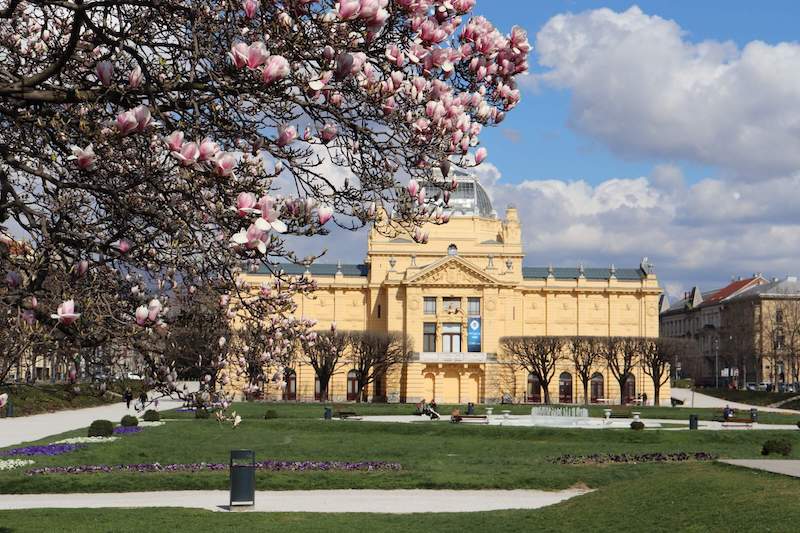
My situation is quite unique as my parents are from Croatia, so I was able to get dual citizenship through them. This made things much easier for me in regard to getting a job, opening up a bank account, etc.
However, traveling to Croatia is not difficult and most visitors are typically allowed in for 90 days at a time with just their passports. There has recently been a lot of talk about Croatia implementing a Digital Nomad Visa, so that is something to keep an eye out for if you’re interested in living and working in Croatia.
10. Was it easy to make friends? Do you socialize mainly with locals, expats, or both?
I socialize with both locals and expats in Croatia, but mostly locals now.
Being at a university and in classes with mostly local MBA students really helped me to become friends with the locals. It was such a natural and easy environment to make connections in. Getting a job at a local company also helped with making friends and had a huge (positive) impact on my Croatian language skills.
11. If you could give one piece of advice to people moving to Croatia, what would it be?
Take advantage of Croatia’s natural beauty! Zagreb is a small city, but there are so many incredible places to see that are only a short drive away. From numerous castles, mountains, national parks and the sparkling Adriatic Coast, there are plenty of hidden gems in Croatia waiting to be uncovered.
If you need someone to go with, don’t be afraid to reach out in the local expat Facebook group! The members are very friendly and up for organizing meetups and outings.
12. What does home mean to you?

Home means a lot of things to me. It’s the tail-wagging and unconditional love that greets you after a long day. It’s the familiarity of a place, the comfort of knowing where to go. It’s a warm hug from a friend or family member you love dearly. It’s the place you want to run to when you’re lost.
Home is somewhere you always feel you can return to no matter how long it’s been, and it will always be there to welcome you with open arms. Whether it’s a person, a building, or a place.
13. What do you miss most about living in America?
Aside from my parents, family, and friends, I would have to say that convenience and administrative efficiency are the two things I miss most.
14. What’s the biggest adjustment you’ve had to make living in Croatia?
Getting used to driving!
The roads here are so narrow and people drive way more aggressively (not to mention faster) than they do in the US. Driving in Zagreb also means you have to keep your eyes out for pedestrians and trams in the city.
During my first year in Zagreb, I basically only drove from home to my university and back. Now I feel like I’ve mastered the rules of the road and am much more comfortable driving.
15. What is the quality of life in Croatia like?
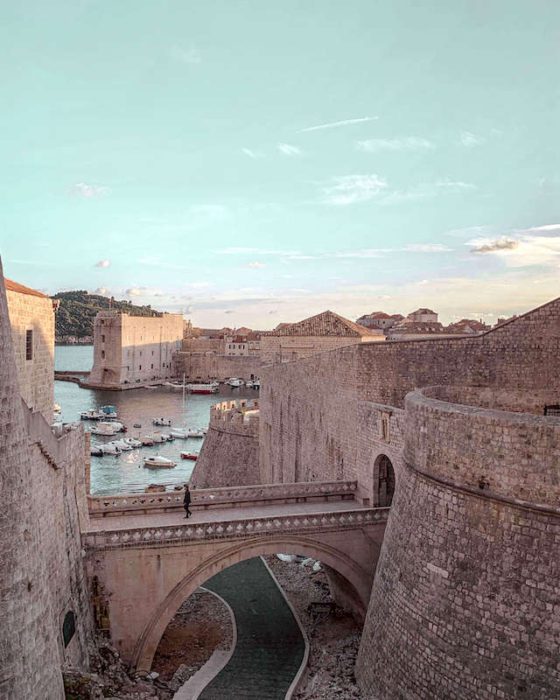
Croatia is one of the safest countries I’ve been to. I can walk around Zagreb alone at any time of the night and feel totally safe. This is not to say that crime doesn’t ever happen, but it is not very common.
The cost of living in Croatia is great if you are on an American salary or make more than the average Croatian salary (which is less than 1,000 EUR a month). Food and groceries are reasonable, and even cheaper than some places in the US.
Healthcare in Croatia is of good quality, and because of the national healthcare system, I rarely ever pay for anything out of pocket.
16. You’ve been living in Croatia for a while now, do you feel like you fit in culturally?
Six years later, I definitely feel like I fit more in now than I did when I first arrived. Most days I really feel like a local, but there are still occasional situations that remind me I’m a foreigner.
17. How does the work life/culture differ from America?
People in the US live to work, while people in Croatia work to live. There is a huge difference in mentality when it comes to work-life balance. In Croatia, people really value their free time, and they make an effort to carve time out of their days to nurture their friendships, relationships and hobbies.
18. Did you find any great resources when planning your move to Croatia?
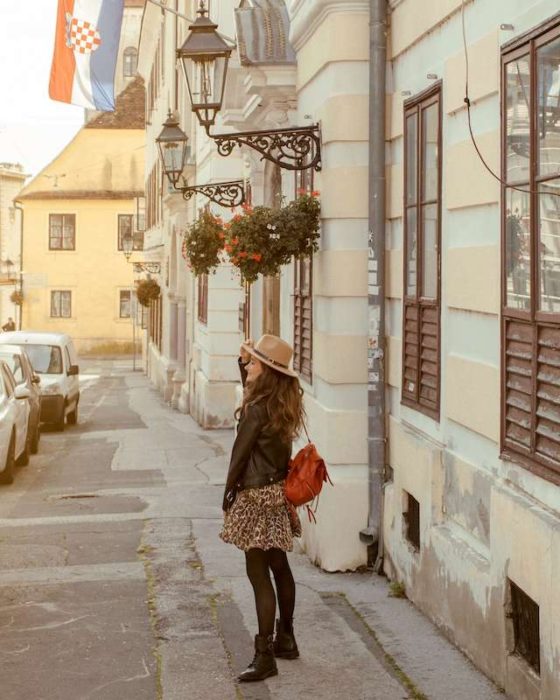
Not necessarily when planning my move, but there is an Expats in Zagreb Facebook Group that is definitely a great resource for anyone looking to move here (or that already lives here).
19. What do you know now, that you wish you’d known when you first moved?
Making the decision to move abroad means that you’ll miss out on big life events back home.
Weddings, graduations, funerals, milestone birthdays, you name it. Sometimes friendships will fade away, but those who care will understand and you’ll keep in touch. You grow to learn that it’s simply a part of choosing this path and that life doesn’t stop when you leave home.
20. Would you have done anything differently?
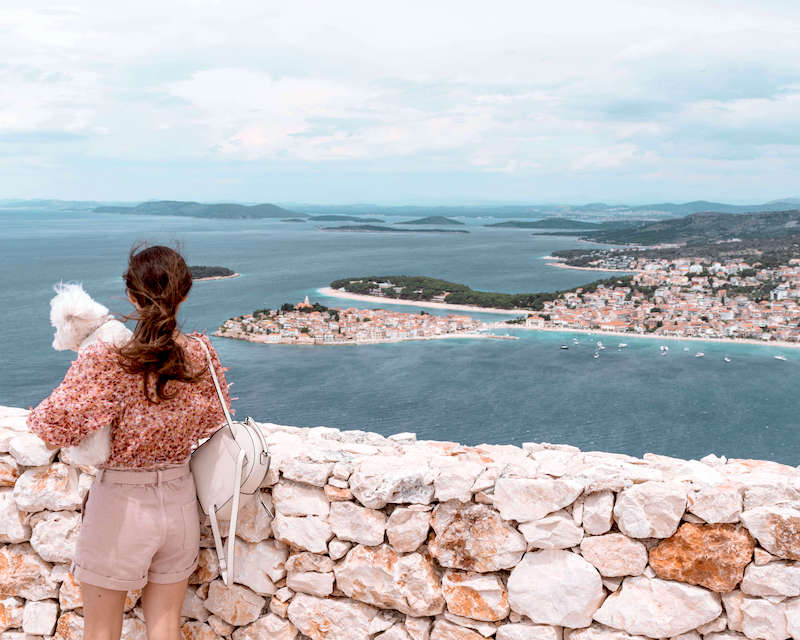
Nothing 🙂 I would do it all over again.
Thank you so much, Olivia, for sharing your living in Croatia expat story. It seems like such an incredible place to live. To learn more about Croatia and Olivia’s life there, check out her gorgeous Inspired by Croatia blog.
Would you move to Croatia? Tell me in the comments below.

Thinking about moving to Croatia? Save this for later and PIN IT
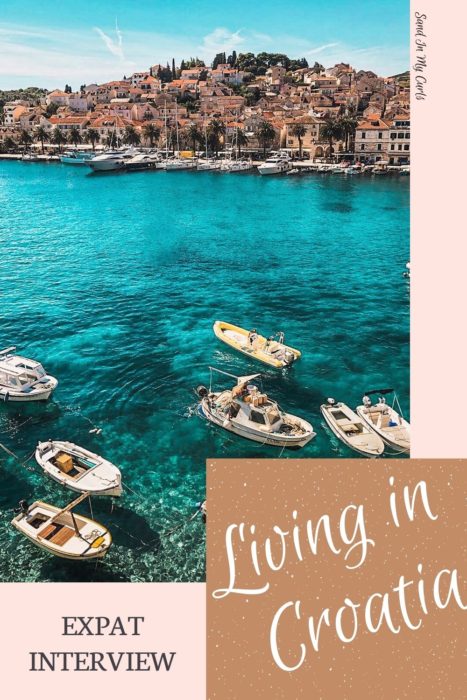
Want to learn more about how expats live around the world? Read about Diane, Derek, Katherine and Carlie.

Great post, v. informative, and very cute pooch too!✨
Hi Cherryl,
Thank you!
And isn’t that little love bug adorable?
Hi Kirsten, I loved reading this article – I went to croatia for the first time about 3 years ago and spent a month there. I loved Zagreb where we stayed for 2 nights en route to a little island where a Canadian friend of us has a holiday home (he is originally Croatian).
But the thing about this article is, it reminds me so much of living in Portugal – these smaller and poorer countries are just as she describes! No big stores with much less selection (amazon is good tho!!). Markets important and amazing etc etc
Americans are moving in droves to Portugal …
Love to read your blogxx
Hi Murrae!
Great to hear from you!
I can’t wait to go to Croatia AND Portugal. It is long overdue as you know!
Stay well,
K
Thanks Kirsten. Sure is an amazing country. Basically a ‘must do’ at least once in your life!
Hi Kerry,
I’m super excited to explore it one day. Soon would be nice but…